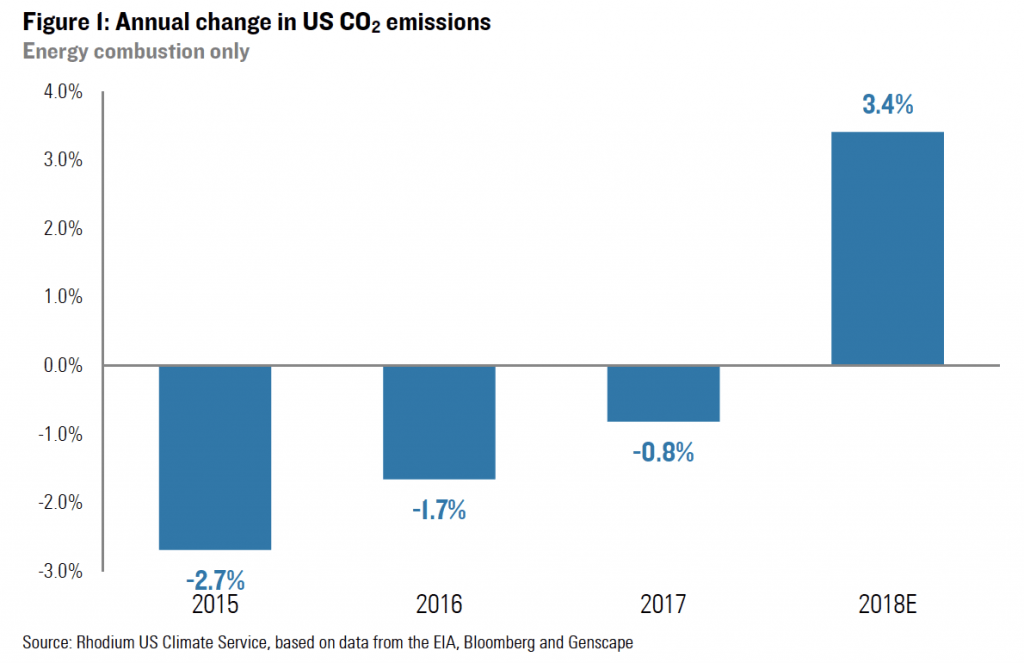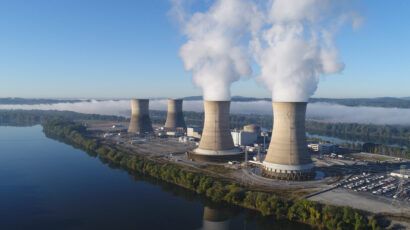A short-lived White House climate “victory”
By Dawn Stover | April 17, 2019
 The Trump campaign plans to brag about how it reduced greenhouse gas emissions in 2017. But 2018, and the overall trend, don’t look so good.
The Trump campaign plans to brag about how it reduced greenhouse gas emissions in 2017. But 2018, and the overall trend, don’t look so good.
In the runup to the 2020 election, the Trump campaign is reportedly drawing up a list of “climate change victories” that it can tout to the record number of Americans who say they care about global warming (including a growing number of Republicans who believe immediate action is needed). At the top of the list: data showing US carbon dioxide emissions fell during Trump’s first year in office.
The campaign is apparently hoping voters won’t notice that emissions rose by 2.8 percent in 2018, Trump’s second year in office, after declining for the four previous years. Maybe voters won’t ask why Trump’s regulatory rollbacks, cited as the reason for the 2017 emissions reductions, failed to continue delivering.
The 2018 increase in emissions was the largest since 2010, and the government’s data might be an underestimate. The Rhodium Group, an independent research provider, estimates that emissions increased by 3.4 percent—the second largest annual gain in more than two decades.
The White House may be expecting a better result this year. In late January, the US Energy Information Administration (EIA) predicted the nation’s energy-related carbon dioxide emissions would decrease in 2019 and 2020.
“Weather conditions and continued economic growth were the primary factors in increasing energy consumption and emissions in 2018,” the EIA explained. “Last year was very warm,” so Americans cranked up their air conditioners. The EIA also reported that last year’s winter months were “colder than the previous 10-year average.” In other words, it was both hotter and colder than normal, which led to record levels of electricity and natural gas consumption.
Perry Lindstrom, Senior Energy/Environment Analyst with the EIA, says there will be fewer “heating degree days” and “cooling degree days” in 2019 and 2020. These are measurements, respectively, of the extent to which the daily outdoor temperature exceeds or falls below 65 degrees Fahrenheit—they serve as indicators of heating and air-conditioning demand. “We use NOAA weather projections, and they are forecast to return to closer to normal than 2018 weather,” Lindstrom told me in an email in January.
So far, that hasn’t happened. The first three months of 2019 turned out to be the coldest start in five years. And although the EIA is still predicting that the average US residential customer will use about 5 percent less electricity this summer than last, NOAA is forecasting above-normal temperatures across much of the United States through June 2020.
Meanwhile, transportation-related emissions (which have outpaced electricity-related emissions in the past few years) are likely to continue climbing. The Trump administration has proposed freezing Obama-era fuel-economy standards at 2020 levels. If no new efficiency improvements are required, and travel demand continues to rise, transportation emissions will inevitably increase.
The long-term outlook is dismal. Hewing to the Paris Agreement would mean a 26 to 28 percent reduction below 2005 emissions levels by 2025. But if current trends continue and the federal government fails to enact new regulations, the EIA predicts US energy-related carbon dioxide emissions “will remain near current levels through 2050.” That would be a disastrous defeat for the climate.
Publication Name: McClatchyDC
To read what we're reading, click here
Together, we make the world safer.
The Bulletin elevates expert voices above the noise. But as an independent nonprofit organization, our operations depend on the support of readers like you. Help us continue to deliver quality journalism that holds leaders accountable. Your support of our work at any level is important. In return, we promise our coverage will be understandable, influential, vigilant, solution-oriented, and fair-minded. Together we can make a difference.
Keywords: emissions
Topics: Climate Change, What We’re Reading















